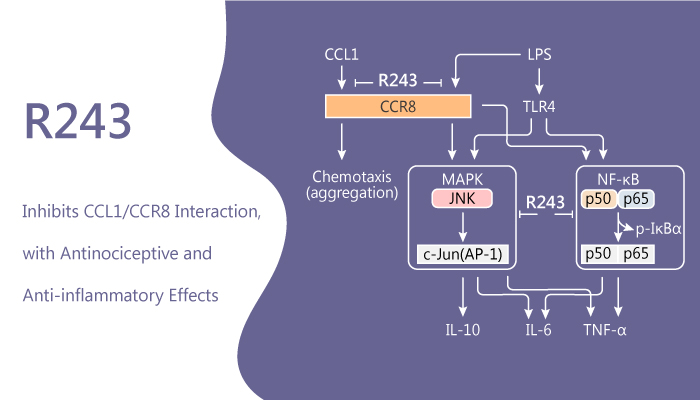Chemokine (C-C motif) receptor 8, also known as CCR8, is a protein encoded by the CCR8 gene in the human body. Besides, CCR8 is the chemokine receptor of CCL1. Moreover, CCR8 expressed in T-helper type 2 lymphocytes and peritoneal macrophages (PMφ). And it involves a variety of pathological conditions, including peritoneal adhesion. Furthermore, CCR8 dependent cytokine secretion is characteristic of PM φ. CCL1/CCL8-CCR8 system is relevant to the pathological process of various inflammatory diseases. CCR8’s involvement in these diseases suggests that it plays a role in inflammatory / allergic reactions by inducing tissue damage and remodeling. Therefore, blocking CCR8 may be beneficial in reducing or preventing inflammatory events. In addition, CCL1 is not only relevant to immune function, but also the regulation of nociception. R243 is a potent, selective CCR8 antagonist and inhibits CCL1/CCR8 interaction, CCR8 signaling, chemotaxis.

R243 is a potent and selective CCR8 antagonist and inhibits CCL1/CCR8 interaction with antinociceptive and anti-inflammatory effects.
But, how does R243 has antinociceptive and anti-inflammatory effects via CCR8? Let’s discuss it in detail. First of all, R243 is a potent and selective CCR8 antagonist. Specifically, R243 inhibits CCL1/CCR8 interaction and inhibits CCR8 signaling and chemotaxis. R243 has antinociceptive and anti-inflammatory effects.
In the second place, R243 has CCR8-antagonistic effects on CCL1-induced Ca2+ flux and CCL1-driven peritoneal macrophages aggregation. Meanwhile, R243 attenuates secretion of TNF-α, IL-6, and most strikingly IL-10 from wild-type peritoneal macrophages (WT PMφ). Nonetheless, R243-treated WT PMφ shows suppressed c-jun N-terminal kinase activity and NF-κB signaling after lipopolysaccharide (LPS) treatment when compared with WT PMφ.
Last but not the least, R243 treatment inhibits the analgesic effect evoked by CCL1 in a dose-dependent manner in male Swiss mice. In CCR8-/- mice, administration of R243 reduced peritoneal adhesion in vivo. R243 also prevented hapten induced colitis.
All in all, R243 is a potent, selective CCR8 antagonist and inhibits CCL1/CCR8 interaction with antinociceptive and anti-inflammatory effects.
References:
Tomoyuki Oshio, et al. PLoS One. 2014 Apr 8;9(4):e94445.